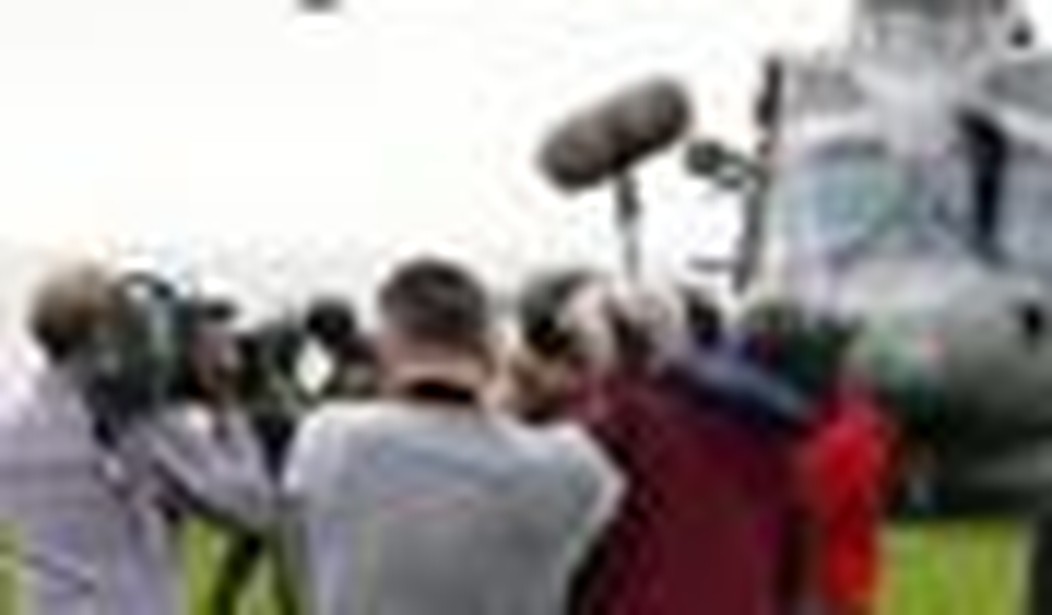I hate newspapermen. They come into camp and pick up their camp rumors and print them as facts. I regard them as spies, which, in truth, they are. If I killed them all there would be news from Hell before breakfast.
— William Tecumseh Sherman
As the fighting rages in Gaza, the world’s media is engaged in a battle of its own with Israeli officials and the IDF, who are refusing to let journalists into the territory to report on the conflict. It appears that if reporters are allowed into the Strip at all in the coming days it will be a small group, under the close supervision of the military.
Ostensibly the IDF cites concerns over the safety of journalists as the reason for restricting media access, and it has a point: monitoring and protecting journalists is a distraction the army can do without in the middle of intense urban combat.
Of course, the self-appointed heroes of the international press corps will respond that they don’t need looking after, and are happy to risk life and limb in pursuit of the news. But should a reporter be injured or killed, their colleagues are sure to lay the blame squarely on Israel, whatever the circumstances.
Then there’s the risk of journalists being kidnapped by terrorists — sorry, militants — although given the cozy relationship between Palestinian terrorists and the media (see, for example, the Alan Johnston episode) I’m not sure how much of a worry that is for journalists. Most would probably view spending a month as guests of Hamas before being released in a “goodwill gesture” as a useful career move — you’re a shoo-in for any number of industry awards, and you get to lose a little weight in the bargain.
A more pressing concern for the Israeli military, although they rarely admit as much openly, is that the international media can’t be relied upon to report events in Gaza impartially.
With some understatement, the Jerusalem Post says: “In the past, Israeli officials have voiced displeasure over the international media’s balance in their coverage of events in Gaza, inflating Palestinian suffering, while not always making clear that Israeli military actions came in response to Palestinian attacks.”
Putting it more bluntly, the world’s press in general (there are of course exceptions) long ago chose sides in the Israeli-Palestinian conflict, and they sided with the Palestinians. Driven in some cases by a soft-left worldview that demands unquestioning sympathy for the perceived victims of a given conflict, and in others by a hard-left ideology that blames Israel and the United States for all the ills of the Middle East, the media has for years tended to sympathize with the Palestinians, while missing no opportunity to criticize Israel.
Led by CNN and the BBC, and by newspapers such as the New York Times and the UK Guardian (which published a respectful obituary of slain Hamas leader Nizar Rayan), the media is framing the latest outbreak of fighting as a David versus Goliath affair, with Israel responding “disproportionately” to Hamas rocket attacks, and as a conflict that can and should be resolved by international diplomacy.
Meanwhile, stories of Hamas’s atrocities against fellow Palestinians, of Hamas diverting medical supplies from civilians to treat its fighters, and of Israel treating Hamas terrorists in its hospitals go largely unreported outside the Israeli press and pro-Israel blogs.
The bias is often subtle (and at least in the case of the BBC appears to be relatively mild compared with its coverage of the 2006 Lebanon war). Spokesmen for Israel are repeatedly pressed to justify the actions of their armed forces, while representatives of the Palestinians and Hamas are allowed to declaim at length. Another recurring theme of the reporting is that, because Hamas is still managing to launch missiles into Israel, the entire campaign is a failure.
But it’s bias nonetheless, and for that reason alone Israel should no more allow the press unfettered access to Gaza than it should allow a brigade of Iran’s Revolutionary Guards to fly into Gaza’s airport to reinforce their Hamas proteges. The last thing Israel needs is Christiane Amanpour, CNN’s resident apologist for radical Islam, wallowing in an emergency room full of wounded civilians, or BBC reporters weeping over the death of senior Hamas terrorists, as Barbara Plett wept for the dying Yasser Arafat.
And leaving aside issues of balance, the media has repeatedly shown itself to be susceptible to manipulation by the propaganda arms of terrorist organizations. Remember the Jenin “massacre” that wasn’t? Or the many examples of “fauxtography” and stage-managed incidents during the 2006 Lebanon war — a phenomenon that’s being repeated in Gaza? Hamas knows that while it has no chance of defeating Israel on the battlefield, it enjoys a distinct advantage in the arena of public opinion; combine a cynical opponent with a credulous media eager to believe the worst about Israel and you have the recipe for a public relations nightmare. Another factor that leads to skewed coverage is the fact that news organizations, especially the TV news channels, are increasingly in the business of entertainment and chasing ratings.
The nature of the present conflict means the most dramatic pictures are coming from Gaza, and so viewers are exposed to virtually continuous footage of killed and wounded Palestinians, rather than shots of damaged buildings and the occasional wounded civilian in Sderot. Meanwhile, news channels compete to “set the agenda,” and under pressure to fill airtime, engage in pointless exchange between partially informed reporters in the field and clueless anchors back in the studio, which do little to add to the viewers’ understanding of a complex situation.
Whatever the motivation, by focusing almost exclusively on the alleged excesses of one side, by highlighting the disparity in casualties without explaining the reasons for the disparity, and by depriving its audience of context by failing to discuss the underlying cause of the conflict — Hamas’ refusal to recognize, and commitment to destroy, the state of Israel — the media whips up sympathy for the Palestinians that would be less forthcoming were the public better informed.
And aside from misleading the public, one-sided journalism can have serious consequences. A study of reporting from Iraq showed that negative coverage of U.S. actions had the effect of emboldening insurgents, and Hamas gunmen will doubtless be similarly inspired by the news that the “international community” is growing increasingly vociferous in its criticism of Israel.
Even if we accept the dubious post-modern argument that the world has the “right” to know what’s happening in Gaza, that doesn’t mean the media should be allowed to run amock. As it is, there are some reporters and film crews inside Gaza, while organizations such as the Red Cross and the UN (which can hardly be accused of favoring Israel) are able to communicate with the outside world. And while it could be argued that Israel should let journalists who are considered impartial, or even favorable towards Israel, into Gaza to counter the Hamas propaganda machine, experience has taught the Israelis that on the whole the media tends to do more harm than good.
The nauseatingly self-regarding modern media seems to think it has a God-given right to ride into every battle on the first tank, with its biggest stars burnishing their reputations while others suffer and die around them. It doesn’t, and the Israelis are wise to try and keep them at the Gaza border.









Join the conversation as a VIP Member